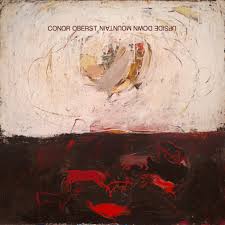To the uninitiated, the recorded output of Conor Oberst can prove both bounteous and overwhelming. He is a teenage prodigy-turned-adult singer-songwriter who has already written hundreds of songs and released nearly two dozen albums over a twenty year period. At the age of 34, he shows few signs of pausing for half time oranges like The Rolling Stones in the 1990s. Nor does he seem likely to embrace the self-reflective mid-career hiatus enjoyed by Stevie Wonder and Eric Clapton.
Oberst has been recording music since he turned 13-years-old. He has been touring since the age of 16. Over the last two decades, he has explored numerous musical genres in myriad guises and configurations. Since 1998, nine albums have been release under the name Bright Eyes, a revolving musical troupe of which Oberst is the only permanent member. In 2005, Bright Eyes simultaneously released two albums, the electronic inflected Digital Ash In A Digital Urn and the more traditional I’m Wide Awake, It’s Morning, and Upside Down Mountain is his fourth solo album since his 2009 debut.
Throughout his career, Oberst has tangled with preoccupations familiar to anyone who has crossed the Rubicon from teenage years to adulthood. His songs concern feelings of love, heartbreak, yearning and politics. In his younger days, Oberst used to narrate the extremities of youth. Early Bright Eyes albums unleashed geysers of imagery and Oberst’s anxious delivery. His voice – a wobbly tremor – can switch quickly between hysteria and fatigue. Albums like Letting Off The Happiness and Fevers And Mirrors alternated between excitement and despair. The experience was like reading a blog written by a particularly precocious teenager.
Upside Down Mountain is Oberst’s first collection of songs since Bright Eyes released The People’s Key in 2011. The album began life in demo form in Los Angeles before recording commenced in Oberst’s native Omaha and Nashville. It also marks his first collaboration with producer and musician Jonathan Wilson. From the opening chords of its first song, ‘Time Forgot’, the collection is the least restless example of Oberst’s work to date. The 13 songs sound unfussy and clear. Speaking of its recording, the singer told Rolling Stone about his search for a like-minded producer with disarming honesty. "I tried to work with some big-name producers. And it was like, this dude doesn’t know shit from shit," he said.
Wilson, whose own Gentle Spirit and Fanfare albums demonstrate admirable musical economy and the quiet sophistication of Jackson Browne’s 70s work, has distilled the songs down to their essential parts. He has added light guitar fills, percussion and brass. The Swedish folk duo First Aid Kit supply the album’s backing vocals and harmonies. The results don’t mean Oberst is a more conventional songwriter. Instead, for the first time in his career, his songs are moored to a musical foundation which doesn’t distract from his prose.
There is little here which could be considered redundant. ‘Hundreds Of Ways’ and ‘Kick’ are both briskly paced and focused pop songs. On ‘Time Forgot’ Oberst sings about a new start: "Polished my shoes/ I bought a brand new hat/ Moved to a town that time forgot". Seconds later, the song hints at turmoil: "I want to walk in the howling wind/ Till it scatters all my thoughts/ Sit alone on that river bank/ Until I forget that I can talk. Just listen".
Followers of Bright Eyes’ music have long commented on Oberst’s shaggy dog confessionals. Throughout his teens and twenties, the emo-bard of romance has specialized in emotional epiphanies. ‘Upside Down Mountain’ contains its fair share of themes that will resonate with his native audience. On ‘Artifact #1’, he sings, "What would it take to gain acceptance? To the grounds behind your eyes/ You know I’m open to suggestion/ The one you made we never tried."
Perhaps due to the voluminous nature of his back catalogue, Oberst has often been compared to Bob Dylan. The comparison is misleading – Dylan’s work trades in half-truths and mischief. His themes are dense and often historical in nature. Oberst’s best work is honest, always autobiographical and often seeks the approval of the listener. I suspect Dylan would be incapable of writing lyrics as direct as those on ‘Night At Lake Unknown’, which features elegant backing vocals over simply plucked chords: "Went on the hunt for fame and fortune/ Picked up the trail just fine/ Everywhere I go, the doors fly open/ But I want out once I’m inside".
By the end, Upside Down Mountain sounds like a rejuvenation. In Wilson, Oberst has found an editor who will reward future collaborations. The singer who once famously claimed, "I’m not gonna grow old anymore. I’ll be twenty forever," has revealed a new-found maturity.


